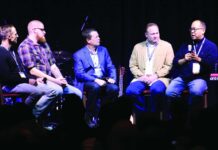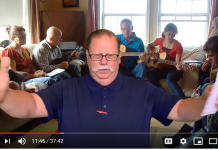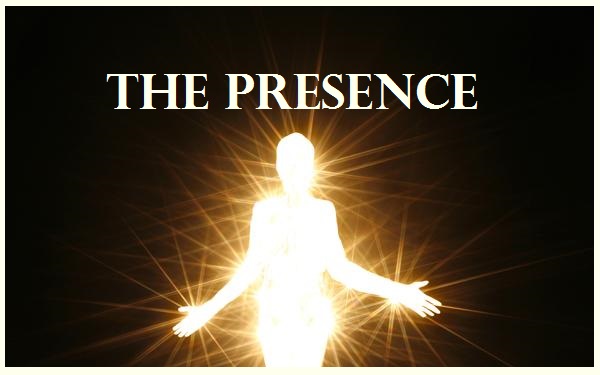For years as a Christian and a pastor, I struggled with my identity in Christ. I was taught that Christ was in His Bible and in His building on Sunday morning. Even though we gave lip service to “He will never leave us nor forsake us,” somehow He wasn’t really there unless I could “feel” Him. I pushed myself to fast, pray, and read whole books of the Bible at one sitting and to separate myself from humanity to deserve His presence. Oh, I taught salvation was free by grace, but sanctification somehow required my work..
You know the drill:
- No reading the newspaper or watching news
- Little or no television
- No drinking (wine, beer, or alcohol)
- No smoking
- No dancing or listening to any worldly music
- Not wearing any gold
- Not attending any non-Christian events
I am sure I am leaving some “NO” out, but maybe you will remember. The end result of such thinking was to create a world of “us and them.” The lost were “thems,” and the only reason I reach out to them was to invite them to “church” and getting them “saved.” I went to prisons weekly, to detention centers, and anywhere I could religiously minister to them. I ended up with almost no non-Christian friends, and to tell the truth, very few Christian friends.
The love of Christ was not on my radar except when it came time to preach, and to be honest I avoided it whenever possible. I would rather challenge God’s people to my goals of self-greatness, misguided diligence, and loveless passion. Our services were usually 3 to 4 hours long because we wouldn’t leave until His presence showed up. When the worship was stale, no problem, I always had a sermon to excite the senses, crank on the people, and have you ready to charge Hell with a water pistol.
During the week when I didn’t feel His presence, I buried myself into more religious works to appease my conscience. I always had a new great idea, but what I didn’t know was it was being fueled by my lack of rest in Him. God had mercy and moved me by His grace into the freedom of being a New Covenant creation. I hope the following teaching by Steve Crosby at least makes you reconsider why you do what you do in reference to your Christian life. For more details on what he has written here, please refer to Steve’s blog at www.stevecrosby.org, or www.stevecrosby.com.
Jose Bosque
The Presence of the Lord: Old and New Testament Distinctions
- In the OC, God inhabits the praises of His people (Psalm 22:3).
- In the NC, God inhabits His people! (John 14:17).
- In the OC, they entered in and out of the Holy of Holies/holy place (multiple OC references).
- In the NC, the Church is the Holy of Holies (1Cor. 6:19 – the năōs of God).
- In the OC, they came in and out of, or up and down to Zion, Zion is His dwelling place, etc. (Psalms of Ascents, multiple Psalm references)
- In the NC we have already come to Mt. Zion (Heb. 12:22). The Spirit-indwelt Church is the Zion of God. We are already “at” the place we profess to sing about. In “Him” is the Zion of God.
- In the OC they brought sacrifices of praise.
- In the NC, we are the sacrifice of praise (Heb. 13:15, Rom. 12:1). The fruit of our lips manifesting what we are.
- In the OC they came “in and out of His presence” (multiple references).
- In the NC He abides with us, and in us forever (John 14:16, Pentecost).
- In the OC we enter His gates with thanksgiving (Psalm 100:4).
- In the NC we are already in Christ, and seated with Him in heavenly places (Eph.2:6). There are no gates to enter. We are already there. He has entered our courts (our being/hearts) by the indwelling.
- In the OC they “called down” God who is in heaven (Psalm 144:5).
- In the NC He came down in the Incarnation and came in on the Day of Pentecost and has never gone back!
- In the OC, they begged for mercy and salvation (Psalm 85:7).
- In the NC, both have occurred in Christ (Rom. Chpt. 9, 11 and many others).
- In the OC, they hoped for forgiveness and assurance (Psalm 51).
- In the NC, both have been realized (multiple references).
- In the OC acts of worship were directed to the Lord invisible. (Davidic praise, Zadok priesthood.)
- In the NC acts of worship are directed at the Lord visible. (When you have done it to the least, you have done it to Me.)
If we really believe that the church universal, the bride, the body of Christ is the fullness of Him that fills all in all,[i] why do we base our worship practice and theology on intangible metaphysics, rather than experiencing Him who is present in us, together in fullness? Why do we expect our “worship experience” to descend out of heaven rather than arising from the midst? I suggest one reason: it’s just easier, and we feel good for it. Experiencing the invisible Christ out of heaven will not require much out of me. Experiencing the present Christ on earth is a lot of work.
The overwhelming majority of references to the presence of the Lord are in the Old Testament Scriptures. That alone should indicate that we should pursue the topic carefully. Paul never preached about the presence of the Lord in a subjective experiential way as we do. Not once. It is not mentioned in the book of Acts in that way either. This stark difference between the two covenants on this topic requires some consideration.
The term “presence or anointing” is as prevalent in Pentecostal/Charismatic circles as salt in the ocean. Considering how little the new covenant scripture mentions it, it seems like too much has been made of too little. In some places, the alleged “presence” has become a fetish, a golden calf: Our services exist to facilitate someone’s idea or subjective feeling of what the presence is, rather than to honor the person of Jesus.
There are only six verses in the New Testament that mention the “presence of the Lord.” None of them have anything to do with praise and worship. They are:
- Acts 3:19 – associated with repentance and conversion.
- 1 Cor. 1:29 – walking before His face; God observing us.
- 1 Thess. 2:19 – His presence at His return.
- 2 Thess. 1:9 – His presence at His return.
- Heb. 9:24 – the presence of God in heaven.
- Jude 24 – the presence of God in heaven.
That is the entire New Testament record the subject. How have we made so much out of so little? The apostles understood that the presence of the Lord was not in a mountain, special times, i.e. feasts, special class of people: professional priest/clergy, etc., see John Chapter 4). I merely live, abide, and function in Him, and the “anointing” or the “presence” happens. Jesus said that His Father and He would manifest themselves to those who love Him and keep his commandments, not those who sing and carry on in a song service for an hour or who preach up a barn-burner message. Singing and preaching are just more fun than naked obedience (John 14:21).
Stimulus on Sunday is just more exciting to us than boring obedience on Monday. So, we give ourselves to stimulus. In some cases we even pay for professional stimulators, thinking that an increase of endorphins in our blood stream is the same as the presence of God. This is simply not true. An adrenaline rush is an unreliable evaluator of what is, or is not, His presence. The preaching of the cross is the power of God, and transformation into the image of Jesus is the goal of the Christian life, not cathartic highs in service.
1 John 1:1-4 AV (Emphasis mine)
That which was from the beginning, which we have heard, which we have seen with our eyes, which we have looked upon, and our hands have handled of the Word of life; (for the life was manifested and we have seen it, and bear witness to it, and bear witness, and show unto you that eternal life, which was with the Father, and was manifest unto us;) that which we have seen and heard declare we unto you, that ye also may have fellowship with us and truly our fellowship is with the Father, and with his Son, Jesus Christ. And these things we write unto you that your joy may be full.
What was ethereal presence in the Old has become flesh and blood presence in the New. That is the essence of Christianity. It should affect all our understanding, on every topic. They had seen and handled it (Him). The substantive reality of that presence filled them on the Day of Pentecost. They weren’t looking for sensations out of heaven anymore. Heaven was in their hearts and it was as real as their next breath. The manifest presence of God is in Jesus Christ, and in Him, in the believer. This is the change from the Old to the New Covenant. They got it. We’ve lost it. It’s time to get it back.
It is my contention that in many evangelical, charismatic, and apostolic-prophetic environments, that we have degenerated into old covenant, if not pagan beliefs and practices. It has drifted from a sound New Covenant understanding into regressive and manipulative Old Covenant paradigms, paganism, neo-Gnosticism, and New Age beliefs which pander to our culture’s addictive need to be stimulated and entertained. That which was legitimately birthed by the Spirit of God in a renewal movement of our forefathers, no longer accurately represents Jesus’ interests in the earth. We believe our forefathers would weep to see what their values have become in our generation.
When you’re born into something, it can be quite normal to thoughtlessly assume: “This is the way it has always been,” or “everyone does it this way,” or “this is the way it should be done,” or “this is the right way,” or more unfortunately, “anyone with spiritual understanding as good as ours, does it this way.”
The theological perspectives and underpinning of our practices are rarely talked about, because we are too busy having a good time, and no one wants to talk about anything that might stop the party. That’s the definition of ritualism: doing religious things, but not really knowing why. Worse yet is using spiritual techniques of the supernatural believing that they somehow obligate God to do what we think should be done: give us His presence. That’s the definition of paganism and witchcraft—with or without a justifying biblical proof-text.
Rather than reckoning into and appropriating by faith the reality of what is objectively true (because Jesus has said so, regardless of what we might “feel”), we think we have to go through certain charismatic gymnastics to get a reluctant God to manifest Himself to our senses. Sadly, our beliefs and practices in this regard are at their philosophical root, diluted paganism. The Pentecostal outpouring and indwelling is the release of Jesus’ coronation anointing in heaven. It is Christ’s King-Priest anointing shed into the earth, in the hearts of his own. In His ascension to the Father, He established a new filial relationship for all who would be His for all eternity: His Father is our Father. The love He shares with the Father is the love the Father shares with us. And eternity will not be long enough for us to sing and shout his praise!
Modern church practices are saturated with an Old Covenant mindset that believes we are rewarded with the manifest presence of God, and His gifts–quid pro quo–by how well we have “cultivated an atmosphere for Him to dwell” in when we gather together. This is pagan thinking. This is Old Covenant bondage. When we operate in these Old Covenant motifs, we need to understand that regardless of how stimulated, excited, or emotionally touched we may be, we are operating under the terms and methods of a system that God has forever cursed and set Himself against.
This is the glory of God, realizable in and through the believer, by the Holy Spirit in clay vessels, that we are loved with the same love that the Father has for the Son and that He has ALREADY GIVEN US His glory. We do not have to sing, shout, or preach for it. It is the glory of a Father-Son relationship (John 17:21-23). The glory abides. As we behold Him who is the Son, as in a mirror, as we see His glory as the Son, we are changed into that image, from glory to glory. This has everything to do with the inner eyes being opened to see Jesus for who He is, and who He is in and through us. It has nothing to do with what happens or does not happen in a worship service/meeting.
This is very serious business. However, the good news of the gospel is that this all can be remedied in a day, a moment, through Calvary. If we make the person of Jesus and His cross central to all that we think or do, rather than our stimulus in a meeting, we can easily regain our footing on New Covenant ground.
The agent of transformation is the indwelling Spirit, who applies the cross in us, to take us into His death and resurrection life. However, preaching the cross doesn’t sell. It won’ fill buildings. But bribing people with his “presence” as a reward for their attendance and participation in a meeting, and threatening them with being cut off from His presence if they do not comply, is a very persuasive form of totalitarianism. That will fill buildings.
Steve Crosby
Pagan Practice of Seeking the Presence of God
Editor’s Note:
So whether we are striving to find His presence in a building on Sunday morning during the “worship time,” or whether we are trying to put fear in God’s people that unless they attend on Sundays they are missing “His presence,” we are manipulating people and following a pagan practice of “going to seek the presence of god.” I know this doesn’t sit well with 95% of “Church” today, but we are not here to please men or to fear religious banishment (we are already exiles) just as long as we continue to see the smile on our Lord’s face. May this teaching really “set the captives free,” and may it take you, dear reader, into a closer walk with Him.
Jose L. Bosque
[i] Eph. 1:23.










































Yes! This is so good! Thank you for sharing these thoughts! I needed to hear this.
Thank you Gayle!
Well, in my church we sing and dance to praise The Lord, not to bring Him forth. Maybe The Vineyard is special in this way, I don’t know. But I do know that God is well pleased with our appraisal of Him. God is present all the time yes, but He shows Himself when we ask Him to come. Why not do that in a song? Maybe some churches manipulate and scare people. In my experience God will gently teach those through Love. Not through spiteful little men
Thank you for your comment Mikael
Needed this. Wow!!!!! Helps piece the puzzle. Praise God.
Blessings to you on your journey Steve! Pass the word.
Much love Jose
[…] A more theological perspective on the same subject by another of our great authors please read https://godsleader.com/pagan-practice-of-seeking-the-presence-of-god/ by Steve Crosby […]
[…] the Lord help you quit chasing His Presence which never leaves us in the New Covenant and may you always seek to be filled again and again with […]